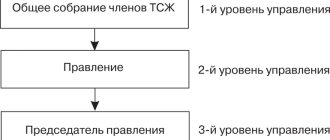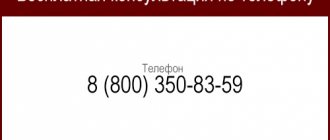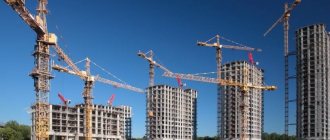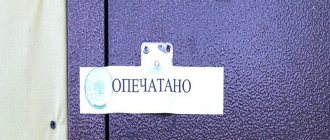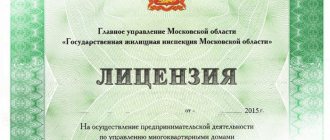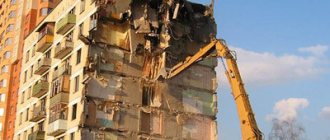An HOA, like any business organization through which large sums of money pass, does not always act within the law.
There are several fraud schemes that are often carried out by chairmen of management organizations.
The consequences of illiterate or negligent management are no better than from waste: an uncleaned yard and entrances, delays in repair work, poor lighting in the area near the house.
And this is also a reason for a complaint, because you have the right to good service under the Law “On Protection of Consumer Rights”.
Who can conduct an inspection?
First of all, you, as a client of this organization, have this right.
If you suspect your partnership of waste or incompetence, take the time to first get a copy of the agreement you entered into with it.
Find points there where you can receive complete information about the activities of the HOA, and begin to act.
Article 150 of the RF Housing Code sets out the provisions on the audit commission. This is a body of the HOA, recruited from residents who are not on the board at the same time.
The Audit Commission is obliged to check the activities of the current board. But at the same time he cannot interfere in his decisions.
The prosecutor's office has this right. The Federal Law “On the Prosecutor's Office” dated January 17, 1992 gives it the authority to supervise the actions of legal entities. An HOA has the right to carry out its activities only if it is registered, so supervisory powers also extend to residents' associations.
ATTENTION!
Although the prosecutor's office specializes in complaints about organizations' failure to comply with criminal laws, do not be afraid to file your complaints there. Even if the prosecutor considers them non-core, all data will be forwarded to the necessary authority for verification.
The State Housing Inspection and Rospotrebnadzor have the opportunity to check the activities of partnerships. The competencies of these bodies are similar in the matter of housing inspection.
The housing inspection checks the condition of the infrastructure of the house and the surrounding area to ensure its compliance with sanitary and fire safety standards.
Rospotrebnadzor can check whether the services provided comply with the agreement concluded with residents and sanitary standards. Its competence is narrower than that of the housing inspection.
Rospotrebnadzor employees rather check specific facts of poor quality services provided to HOAs.
Who can initiate an HOA audit and how to conduct it
After receiving the keys, homeowners in an apartment building will have to choose a management organization. The latter is called upon to maintain order in the building and resolve any important issues. The most popular form of government today is considered to be an HOA.
The owners' association is formed directly by the apartment owners. Each of them has the right to know how and on what money is spent by members of the HOA board. An independent inspection - an audit - is called upon to answer this question. Let's take a closer look at how to check the activities of an association.
Why is verification needed?
The need to check the HOA is due to the regular receipt of funds into the organization’s accounts. Lack of proper control is fraught with waste, which is a violation of current legislation.
The most common variations of deception and their consequences are as follows:
- Signing fictitious contracts, and subsequent withdrawal of funds to the accounts of interested parties through third-party companies. As a result, only part of the funds from the general fund remains under the management of the HOA. Lack of money negatively affects the maintenance of the house and surrounding area.
- Ignoring laws and audit requirements. Members of the HOA board take funds in cash, which can be regarded as theft and tax evasion.
- Negligence in the provision of services. It is fraught with the deplorable condition of the house and surrounding areas.
Who has the right to conduct an audit?
The audit of HOAs is carried out not only by specialized organizations. Any homeowner can initiate an inspection.
To do this, you must first carefully study the contract concluded with the organization. Based on specific points, you can obtain from board members the most detailed information about the activities of the HOA.
Audit committee
It is a body that includes some residents of an apartment building. Moreover, the latter should not be involved as members of the HOA board.
Mention of this organization can be found in Art. 150 of the country's Housing Code. By law, the commission does not have the right to correct decisions made by the board of the partnership. Her responsibilities include auditing and supervising the activities of the HOA chairman.
Prosecutor's office
The Law on the Prosecutor's Office regulates its rights regarding control over the actions of legal entities. In order for the activities of the HOA to be within the framework of the law, the organization must be registered.
A correctly completed complaint to the prosecutor's office will be considered or forwarded to the appropriate address to initiate an investigation.
Other authorities
The following organizations are entitled to conduct an audit:
- Rospotrebnadzor.
- Housing inspection.
In the first option, more attention is paid to specific cases of unqualified provision of services. In this case, sanitary standards and the signed agreement with the residents of the house must be taken into account.
The inspection, which is initiated by the State Housing Inspectorate, is aimed at assessing indicators such as:
- General condition of the construction site.
- Existing infrastructure and local area.
It is important that both of these factors comply with established fire and health safety standards. Sample complaint to the housing inspection:
Download (zhaloba-na-tszh-v-zhilishhnuyu-inspektsiyu.doc, 34KB)
Control methods
If doubts arise regarding the honesty of the chairmen of the partnership, a corresponding complaint should be sent to representatives of the competent authorities. The latter will conduct the necessary inspection of the HOA (audit). Based on its results, penalties will be applied to the organization.
How to conduct a self-check? You should start by contacting the audit committee. You will need to familiarize yourself with the following documents:
- Accounting department reports.
- Results of the last inventory carried out.
- Reports on completed work.
It is necessary to compare the information received and try to identify any discrepancies. If any work commissioned by the HOA was carried out by contractors, find out information about them through the Unified State Register of Legal Entities.
Theft detection
The question of how to check an HOA for theft is quite relevant. Anyone who wants to achieve the truth can:
- file a complaint with the Prosecutor's Office;
- conduct an independent check.
Legally unskilled residents have the right to hire specialists, whose competent work will help identify those who steal.
Carrying out verification
To ensure that the audit is independent and objective, a special commission performs the following actions:
- Gives an assessment of the activities of the HOA from the point of view of legality.
- Checks inventory lists.
- Makes a request for accounting information.
Actually, the purpose of the inspection commission is to detect cases of illegal embezzlement of funds. Exceeding official powers by board members will also not go unnoticed. Sometimes, to obtain information, it is enough to talk with the residents of the house.
Sometimes residents do not know who can initiate an HOA audit. Such legal incompetence entails impunity and a worsening of the existing situation.
It is permissible to make a decision to conduct an audit at a general house meeting. The latter can be convened by any owner as necessary. This is evidenced by the Housing Code of the Russian Federation (Article 45). Please note: an unscheduled meeting is counted if the share of those present is more than 50%.
Cost of verification
It is impossible to name the specific cost of the audit. Commission services are paid in each case individually, based on the available volume of work.
Often, the capital of an HOA does not exceed the threshold of 20 million rubles. In addition, the partnership cannot switch to a specific tax payment system. The cost of an audit under such conditions varies between 25-70 thousand rubles. The selected company will provide a more specific figure.
Work of the counting commission
The Counting Commission is a body that, at each HOA meeting held, counts how many residents have lost. Its formation may be provided for by the charter of the partnership. If we are talking about absentee voting, members of the counting commission conduct a door-to-door survey.
If you have any suspicions about the work of the members of the HOA board, you should take care of a thorough check. It can be carried out either on your own or with the help of third-party organizations. Both options are regulated by current legislation.
Source: https://zpp.guru/zhkx/proverka-tszh/
How to control?
The easiest way to check the activities of such an organization if you have doubts about its integrity is to send a complaint to the competent authority.
Legally literate people from the Prosecutor's Office or the State Housing Inspectorate will conduct an expert check for violations of the laws of the Russian Federation and impose penalties.
If you do not trust law enforcement agencies, then organize an inspection yourself. First, file a complaint with the audit commission at the HOA. After that, start checking your business data yourself.
Request an inventory list and accounting reports. Check them. Request reports on the work performed. If the HOA ordered work from subcontractors, find out everything about these organizations through the Unified State Register.
Auditing
An audit is an inspection of the integrity of an organization's financial activities.
The company conducting the audit requests accounting data, assesses the legality of the actions of the partnership board, and checks inventory lists.
It will also be checked whether the organization's management acted within the scope of their authority.
Sometimes the heads of the board of residents' associations, bypassing Article 145 of the Housing Code of the Russian Federation, set tariffs, spend funds from the reserve fund at their own discretion, and increase their salaries.
An audit can easily detect these facts, even by simply interviewing residents.
Who can initiate
The subject of the audit company's audit is financial and economic activities relating to the common property of residents. Therefore, the issue of starting an audit can be decided by a general meeting of residents.
According to Article 45 of the Housing Code of the Russian Federation, any owner has the right to convene an extraordinary meeting.
ATTENTION!
For an extraordinary meeting called by a proactive tenant to be valid, 50% or more of the tenants must be present.
Audit cost
The cost of auditors' services is not firmly established and depends on the scale of the work.
Typically, tenants' associations do not have a capital of more than 20 million rubles, and also cannot switch to specific taxation systems, so an audit will cost you relatively little - from 25 to 70 thousand rubles, depending on the company you contact.
Types of reporting for HOAs
The partnership, as a legal entity, is required to report annually on the results of its work. A request for information can come either from the owner of the premises, by sending an appropriate request, or from higher authorities.
Internal reports
Provided to owners of residential premises at the annual meeting, which is held in accordance with Art. 45 Residential Complex of the Russian Federation
, in the second quarter of the year following the reporting one.
IMPORTANT!
The main function is to prove the competence and legality of the actions of senior officials in the field of managing a residential building.
Chairman's report
The report on the activities of the chairman is based on data on the work done and the fulfillment of duties established by the job description, which include:
- Management of the board.
- Drawing up estimates of income and expenses, cash flow control.
- Monitoring compliance with the terms of the agreement between the HOA and contractors, resource supply, and service organizations.
- Maintaining accounting and tax reporting, providing data to the Federal Tax Service.
- Hiring and dismissing workers.
- Monitoring the maintenance of public property in proper condition, for example, making a decision on the start of repairs, checking the elevator, etc.
Each partnership, based on its goals and problems, approves its job description.
Board report
The HOA board is created to assist the chairman in fulfilling his duties in managing the apartment building; their functions are similar. In accordance with paragraph 4 of Art. 151 Housing Code of the Russian Federation
, management can manage collective funds in accordance with the approved budget. The income of the partnership is formed from:
- payments and contributions from owners;
- received government subsidies, including for the maintenance and operation of apartment buildings, provision of utilities;
- revenue from financial and economic activities (FAC);
- other income.
The income is spent on the general expenses of the homeowners association for maintenance, repairs, management, maintenance of the house, wages of hired workers, and part of the funds is sent to specialized funds.
Based on the available data on expected revenues and expenses, the board prepares an estimate for the homeowners association, the report on the implementation of which is submitted to the general meeting.
The main reason for declaring bankruptcy is the debts of the homeowners association to resource supply organizations, which file a claim in court in order to collect unpaid funds.
HOA liability
During the investigation, the chairman's activities are examined for deliberate bankruptcy. If violations of the law are detected on the part of the manager, administrative and criminal liability measures will be taken against him under Articles 160 “Misappropriation and Embezzlement”, 285 and 286 “Abuse and Excess of Power” of the Criminal Code of the Russian Federation.
If guilt is not proven, the partnership will answer for its obligations with its own property (transport, office equipment, bank accounts, real estate), which will be sold, and the funds will be used to pay off debts.
Owners' responsibility
Owners of residential premises are responsible for the debts of the HOA in the case when the reason for their occurrence is non-payment of utilities on the part of the owners themselves. In this case, the resource supply company will take legal measures to collect debts: limiting the supply of resources or going to court.
Homeowners' association reports are divided into internal ones for the general meeting and external ones for supervisory authorities. Any citizen has the right to receive information about the results of the management organization’s work after sending a corresponding request.
The activities of the HOA are audited annually by an audit commission or an independent audit firm.
State supervisory authorities check the work of the organization, studying the reports received, as well as unscheduled, based on incoming complaints from citizens. If a violation of the law is proven, the partnership is held accountable.
In order to collect debts from the HOA, a statement of claim is sent to the arbitration court, which orders an inspection of the FCD to determine the reasons for the formation of the debt. Often, a partnership does not have the means to solve its problems and is liquidated with debts.
Homeowners' associations are non-profit organizations.
Dear readers! The article talks about typical ways to resolve legal issues, but each case is individual. If you want to know how to solve your specific problem
— contact a consultant:
It's fast and FREE
!
According to the provisions of civil legislation, this means that the main purpose of its creation is not the receipt and distribution of monetary profits, but the satisfaction of the non-material needs of its participants.
In relation to HOAs, we can talk about such a goal as organizing the maintenance and servicing of common property - an apartment building.
Interaction with owners
Often, when exercising the rights of an HOA, residents and board members have questions regarding the most problematic and controversial topics, including the relationship between the board and other owners.
Issuance of certificates
Sometimes tenants are faced with the fact that the board refuses to issue them certificates (about family composition or an extended extract from the apartment map) on the grounds that the owners owe rent. Does the HOA have the right not to issue certificates if there is a debt?
This is not a legal practice, which is often used by HOAs or management companies so that residents cover at least part of the debt. Issuing certificates is not a right, but an obligation of the HOA to its residents. This means that they are obliged to issue the necessary paperwork, even if the tenant has never paid his utility debt during the entire stay.
Breaking into an apartment
Another problematic question is whether the board or the chairman of the HOA has the right to inspect the apartment? The Constitution of the Russian Federation enshrines the right of citizens to the inviolability of housing.
Reference! Without the permission of the owner of the premises, no one can enter his premises, even if there is an emergency in the apartment.
There are only two cases when HOA employees can enter an apartment without permission:
- If there is a warrant.
- In the event of a threat of a terrorist attack or the occurrence of a natural or man-made disaster.
Thus, the board’s requirements for inspection of the premises under any pretext are taking meter readings, checking meters, measuring pressure in pipes, checking the temperature of the room, etc. - illegal.
A tenant can voluntarily let members of the board in, but if he is forbidden to enter, then nothing can be done about him.
Accrual of penalties
The HOA has the right to charge penalties for non-payment only if this is stated in the Charter adopted at the general meeting of residents. The accrual of penalties is a coercive measure designed to force the debtor to quickly pay the full payment for housing.
The procedure for imposing a fine does not come out of nowhere. It must be spelled out in the Charter. There are also special provisions of the Tax Code of the Russian Federation that determine the upper limits of penalties.
Attention! The amount of the penalty cannot exceed 1/30 of the current refinancing rate for each day of delay.
Signing the contract
Sometimes residents are outraged that the HOA forces them to sign service agreements.
In accordance with Article 137 of the Housing Code of the Russian Federation, HOAs have the right to enter into agreements with owners on utility services and the procedure for calculating payments.
In this case, the board has the opportunity, on behalf of the residents, to enter into various transactions with utility providers and fulfill its responsibility for maintaining the house. But the HOA has no right to force or coerce a tenant to sign an agreement ; everything must happen according to the good will of the parties.
If there is no HOA agreement with the owner, then the residents will simply have to go to the representative office of the operating company on their own and conclude the necessary agreements.
Disclosure of information about debtors
Lists of debtors, which the boards of the HOA sometimes post for public viewing in the entrances, often become a real stumbling block between the partnership and the residents. The outrages recorded in the “shameful” sheet are quite legitimate.
In accordance with the Personal Data Protection Law, disclosure of such information is expressly prohibited. Without written permission, the HOA board has no right to publish any information about debtors, including these:
- last name, first name and patronymic of the tenant;
- any passport data;
- residential address;
- amount of debt.
The board has the right to compile such lists for itself. Moreover. they are needed to identify debtors and conduct conversations with them, and in case of prolonged delays in payments, to go to court and seek to disconnect the apartment from the system of communal services of the house.
Such lists must be kept in a safe in a closed board room and are not subject to public disclosure. Debtors who see their name have every right to go to court and receive monetary compensation from the board.
The maximum that the HOA can do is publish an announcement with approximately the following content: “5 debtors live in our house. We ask them to pay utility debts in the total amount of 10,000 rubles by January 31 of the current year. Otherwise, we will be forced to go to court to forcefully collect the debt.”
Rights and obligations of the organization
Any legal entity, and the HOA is no exception, has rights and bears responsibilities. They arise for an organization from the moment it is registered with the tax authority and continue until an entry is made in the Unified State Register of Legal Entities.
- laws, primarily the Housing Code;
- contracts with contractors and service providers;
- , not members of the HOA.
Law
The main norms listing the rights and obligations of HOAs are the Housing Code.
The rights accordingly include:
- enter into contracts for house management, maintenance and repair of common property;
- draw up estimates of income and expenses;
- establish the amount of utility bills and membership fees;
- perform work and services for residents;
- manage common property;
- conclude various transactions that meet the goals of creating an HOA, transfer funds under them;
- demand from owners to fulfill their obligations to pay payments and contributions, including in court.
The responsibilities of the HOA are listed in. The main one is ensuring compliance with the requirements of laws and other federal regulations and the charter of the partnership.
Other responsibilities include:
- home management;
- fulfillment of obligations under concluded contracts;
- maintain the condition of the common property of the house in proper condition (technical, sanitary, etc.);
- ensure the fulfillment of their duties by owners of apartments and non-residential premises;
- respect the rights and interests of all owners when disposing of common property;
- maintain a register of HOA participants;
- register all changes in the charter in the prescribed manner.
Theft in HOA
Theft in HOAs should be administratively or criminally punishable. If residents, when identifying thefts in the management of the HOA, were unable to agree on voluntary compensation for the shortfall, they have the right to turn to the courts for help. In order not to get confused in the legislative jungle, it is better to first enlist the support of a highly qualified lawyer.
When a signal about theft is received by the HOA, the executive bodies should be assigned to check the cooperative’s financing reports.
HOA activities
The law calls the main purpose of creating an HOA the management of an apartment building.
This is a fairly broad concept that includes various types of activities, ranging from maintaining the required documents to carrying out commercial activities.
However, several main directions can be identified.
Main
The main area of activity of the HOA is the management of common property in an apartment building.
If we consider this concept in detail, we can highlight management functions such as maintenance and repair. As well as providing residents with various utilities.
If you make a list of the main tasks of an HOA, it will look like this:
- Ensuring uninterrupted supply of water and sewerage, gas (if the house is gasified), heating (in the cold season).
- Maintaining all communications in usable condition.
- Planning and carrying out maintenance work on the house and surrounding area.
- Concluding contracts for maintenance and performing various works with contractors.
- Organization and implementation of repairs (current and major).
- Maintaining the common areas of the house in proper condition (lighting, heating, cleaning, timely repairs).
- Maintaining technical documentation.
- Consideration of residents' complaints and elimination of the deficiencies indicated in them.
- Calculation of payments and much more.
Economic
The permitted economic activities provided for in Article 137 and include the following:
operation, maintenance and repair of common real estate;
- construction of new facilities classified as common property;
- enter into various transactions, including the alienation of property;
- receive and transfer funds to service providers and performers of work;
- rent out non-residential premises.
Despite the fact that the HOA has a non-profit purpose, it can receive profit from its business activities. But it can only be used to achieve the main goal - managing the house.
That is, the law does not allow the transfer of received funds to the participants of the partnership. But sending them for repairs or improvement is fine.
Income-generating activities are subject to tax.
Therefore, if the HOA receives any money from the use of common property, this must certainly be reflected in the documents. As, indeed, all other actions related to funds or property of the HOA.
Home management
The managerial functions of the HOA is to resolve a large number of organizational issues. They are resolved through the governing bodies. The main one is the general meeting.
He has the right to act on behalf of the HOA. He also signs all documents, including financial ones.
The collective governing body is the board. The audit commission controls the expenditure of funds.
Examination
The HOA manages the building. But this does not mean that their work is not checked or controlled by anyone. Moreover, the activities of the HOA are more transparent than those of many management companies.
In case of dissatisfaction with the work of the board and the chairman, as well as violations of the rights of residents, the latter have leverage. Let's look at how to check the activities of an HOA.
Who is in control?
Control over the work of homeowner associations is carried out both by the apartment owners themselves and by the state:
- the board and chairman of the HOA are accountable to the general meeting;
- any of the owners, even those who are not a member of the partnership, have the right to file claims against actions or, on the contrary, inaction that violated his rights.
The application must be made in writing and addressed to the chairman. He is obliged to review it within the prescribed period and also give a written response about the measures taken or justify his refusal to use them.
This decision can then be appealed to the court.
If no answer was given, or the violations described in the application were not eliminated, then residents can turn to the state with their complaint.
Depending on the nature of the violations committed, the body to which you should contact will be:
- prosecutor's office;
- State Housing Inspectorate;
- Rospotrebnadzor.
In addition to residents and members of the HOA, government services have the right to check the activities of the HOA for compliance with various regulatory documents: tax, migration, fire, etc.
Their visit may be planned or as a result of complaints and appeals from citizens.
Reasons for verification
They will depend on who is the initiator.
If this is the board itself or one of its members, then an audit company can check on request in order to identify possible problems in advance and eliminate them, if the HOA board does not have too much experience in such activities.
Members of the partnership can create an initiative group that will initiate an audit if they have suspicions that violations are being committed in the activities of the board. Usually, in the event of such suspicions, an audit is carried out by members of the initiative group, and based on its results, the issue can be taken further, that is, an appeal can be made to the supervisory authorities. Conducting an inspection on your own is possible because each member of the partnership has the right to familiarize itself with most of the HOA documents. But not with everyone, which is why they resort to the services of auditing companies for in-depth checks.
If the creation of an initiative group is impossible due to the low level of initiative of the residents, or the citizen who wants to carry out an inspection is not a member of the partnership, all that remains is to immediately contact the supervisory authorities. To do this, a complaint can be filed with the prosecutor's office, after which an investigation is carried out upon its filing. To write a complaint, you do not need to be a member of the partnership or even the owner of the housing in the apartment building it serves; it is enough to at least be the tenant of this housing. A complaint can also be submitted to local authorities. Elected authorities have the right to conduct inspections of HOAs at the request of voters.
In the video about monitoring the activities of the partnership
APPLICATIONS AND CALLS ARE ACCEPTED 24/7 and 7 days a week
.
Each resident of an apartment building may encounter problems regarding its management and proper organization of its operation.
In addition, questions may arise regarding cleaning the local area and repairing building structures.
Dear readers! The article talks about typical ways to resolve legal issues, but each case is individual. If you want to know how to solve your specific problem
— contact a consultant:
It's fast and FREE
!
The owner of the premises cannot alone resolve all the issues related to the problems of operating an apartment building, so the solution may be to join a partnership formed by the owners.
What it is
Often, residents of an apartment building regard the actions of the HOA and its chairman regarding financial transactions as not meeting the requirements of the charter.
They believe that the cost of utilities is high, the estimated cost of repairs in the access areas is too high, and the quality of the work performed does not meet the requirements of building codes and regulations.
Questions regarding the requirements of premises owners are resolved by the audit commission.
According to the definition given in the provisions, it is a supervisory body exercising control over the financial and economic activities of the organization.
The Audit Commission has the right to carry out inspections at any time during the current year.
In accordance with the regulations, the audit commission audits the activities of the partnership annually, after which its results are presented to the general meeting.
In addition, an estimate drawn up on the basis of income received and funds spent and a report indicating the amount of contributions and payments made to it are subject to submission.
They are established by the board and approved at the general meeting. The estimate is drawn up by the HOA board in accordance with the provisions.
It allows you to set the amount of payment that is paid monthly by each owner of the premises.
In addition, the estimate includes the costs of cleaning the local area, maintaining in good condition engineering systems for heating, water supply and sewerage, gas supply, and carrying out repair work in individual building structures.
It includes expenses that are established by the regulations of legislative acts and the charter of the HOA. The norm is laid down in the provisions.
Legal acts
In addition to it, a number of provisions are enshrined in the charter and individual regulations developed on the basis of these.
The Audit Commission is elected for two years, after which it is dissolved. To carry out its activities in subsequent years, its members are re-elected.
According to generally accepted rules, the owners of premises hand over contributions to the partnership; the basis and purpose of the inspection of the audit commission is to establish their expenditure in accordance with the items provided for in the estimate.
Election process
Members of the audit commission are elected at a general meeting of premises owners through voting.
As a rule, its members include persons attracted from outside who specialize in the field of finance, owners of premises who are not its members.
The number of members of the audit commission is established by the general meeting, based on the provisions of the charter.
A chairman is selected from its members to represent the interests of the audit commission before the members of the HOA, its board and the chairman.
As for the legal status, the composition may include both legal entities and individuals.
A prerequisite is that they reach the age of majority and are recognized by a medical and social examination as capable.
Video: cost estimates for HOAs and housing cooperatives
Commission Regulations
Each partnership develops an act “,” which is the main document defining its rights and obligations.
The act is approved by the general meeting, which is given the opportunity to make amendments, proposals and comments on its provisions.
The regulations on the audit commission are approved by the general meeting in the manner prescribed by the charter.
Audit check of HOA
The Audit Commission has the right to demand any documents regarding the economic or financial activities of the organization.
If violations are revealed during the inspection, it convenes a general meeting. The issue of the competence of the board or its chairman is put on the agenda.
At the same time, the meeting is presented with documents confirming the fact of violations committed by them.
Who can initiate
Some members of the HOA are wondering how to check its financial activities.
Each member has the right to initiate an audit if he has any doubts regarding the ongoing financial and economic activities.
He must write a request for an audit, which is submitted to the audit commission.
If desired, the person indicated above can organize the collection of signatures of other members so that his claims are not individual in nature, but are dictated by public opinion.
Where does the activity begin?
To audit the activities of the HOA, the audit commission must draw up a work plan.
Based on the submitted petition, the audit commission requests from the board documents relating to financial or economic activities.
As noted above, the board is obliged to submit the documents required for the audit in order to clarify the fact stated in the petition.
The duties of the chairman include checking the validity of the demands and comments that are set out in the petition of the residents of the apartment building.
It lasts 5 days, after which the chairman gives a response in writing.
He has the right to send a request to the utilities serving the house to provide information regarding issues that arise during the inspection.
Based on the results of the audit, the audit commission draws up an act, which is signed by the chairmen of the commission and its chief accountant. If there are objections or comments, they are indicated in the act.
In addition, business paper is drawn up in writing, which is submitted to the chairman of the audit commission.
It is attached to the materials collected during the audit, because it is an integral part of the act.
What are the rights and responsibilities
For the proper performance of the functions assigned to it, the audit commission is vested with the right to demand:
| From the board of the partnership, its chairman, chief accountant, officials of enterprises supplying resources to the apartment building, utilities, documents and materials necessary for the inspection | they must be submitted within 10 working days from the date of receipt of the request |
| Convening an extraordinary meeting of the board and a general meeting of its members | if during the inspection violations are discovered that are directly related to economic and financial activities, the rights and interests of premises owners, offenses that contribute to the creation of a threat to the interests of the HOA, which require urgent resolution of issues within the competence of the board, its chairman |
| Explanations from the board | its involved employees, including officials on issues that are within the powers of the audit commission and the employee |
The Audit Commission resolves the issue of convening an extraordinary meeting of HOA members by voting.
At the same time, she may require proposals and comments to be included in the agenda of the issue. Her demands must be submitted to the board in writing.
She must justify her demands, otherwise her actions are regarded as unlawful.
According to generally accepted rules, the board convenes a general meeting of members of the organization within 10 days.
The countdown begins from the day the board receives the decision of the audit commission on its extraordinary convening.
The board may refuse to convene it, but the measure involves consideration of the case regarding its activities in court.
Her responsibilities include carrying out scheduled and unscheduled inspections. As a rule, scheduled inspections can be carried out every quarter, after the current year, unless otherwise provided by the charter.
As for unscheduled ones, they are carried out at the request of the owners of premises and other interested parties. For example, a management company for water delivery to an apartment building.
The audit commission can carry out an audit of financial activities on its own.
But the legislator allows the involvement of external persons and specialists with appropriate qualifications.
Doing the main job
As a rule, the income of an HOA consists of contributions paid by the owners of the premises, mandatory payments, and other types of revenue included in the charter.
For example, rent for the use of non-residential premises of an apartment building, government subsidies allocated from the federal budget to maintain the house in proper condition, grants.
During the audit, the tariffs assigned by the board for owners of premises as rent and utility bills are checked. They may differ from the tariffs assigned by the municipality.
The funds spent must correspond to the expense items provided for in the charter of the partnership.
The Audit Commission carries out activities whose purpose is:
The Audit Commission should check the availability of estimates of income and expenses that are approved by the general meeting.
They must comply with budgeting rules. Each calculation made must be justified by calculations with reference to formulas approved by the Ministry of Finance of the Russian Federation.
It is also necessary to check the reports of the board to ensure that the funds generated in the partnership are being spent correctly.
Sample report
There is no single report form approved by the legislator, therefore the reports of audit commissions have some differences.
They must be drawn up according to the rules for preparing financial documents. As practice shows, the best form is a tabular form that is easy to read.
It may consist of an explanatory note and tables, which is convenient for understanding and assimilation.
The input section of the explanatory note states:
It must contain reliable facts supported by documents.
For example, the conclusion of a specialist in the field that is subject to verification, explanatory notes from officials responsible for the material part.
The main part of the explanatory note provides a detailed description:
Documentary materials relating to the violation, their copies, certificates, explanatory notes are attached to the report.
If controversial situations arise regarding the compliance of the results of the audit on facts of violations and the regulations on the audit commission, then it is necessary to be guided by the requirements of the current regulations when implementing it.
Measure of responsibility
As a rule, the audit commission is responsible exclusively to the general meeting of premises owners.
The commission is accountable to him, therefore, every year after its expiration it submits a detailed report on the work carried out.
It indicates the amount of money received from the owners of the premises and how it is spent on the needs of common property.
In addition, it reports at the end of the quarter if the charter provides for quarterly audits on the implementation of the financial and economic activities of the HOA.
When conducting unscheduled inspections based on applications from premises owners, a report is submitted immediately after its completion.
In all the above cases, an inspection report with all related documents is attached to the report.
And in conclusion, it should be noted that it is advisable to elect persons qualified as a lawyer or accountant to the audit commission.
Conducting an audit requires that individuals be competent in matters relating to legal documentation and accounting. The measure is aimed at competent execution of the audit.
APPLICATIONS AND CALLS ARE ACCEPTED 24/7 and 7 days a week
.
During the inspection the following must be checked:
Income, expenses of the organization.
Estimates of them. Are they correctly compiled and justified, both in general and for individual works?
How estimates are brought to the owners for their consideration and approval, in a timely manner or not.
Reliability of reporting on estimates.
Before conducting a documentary check, you must request all documentation and access to it.
At the same time, if a planned audit is carried out, then all financial and business documentation will be required. In the event of an unscheduled inspection, documents indicating a possible or detected violation are sufficient.
Then the materials are studied. Outside specialists can also be involved in document analysis. In complex issues, when the competence of members of the audit commission is lacking, this is the best option.
They can consist of membership fees, mandatory payments, as well as other income, for example, rent, subsidies (benefits for certain categories of citizens, etc.).
The tariffs used to pay for housing and utilities are checked. Municipal tariffs are not mandatory for the partnership.
Then expenses are checked, both for statutory activities and for commercial activities. If there is one. All profits received should be spent only on fulfilling the statutory tasks of the HOA.
At the next stage, an audit of the cash register is carried out. Incoming funds, deposited in cash and received from the current account are checked.
The cash book, cash reports, general ledger, forms for settlements with the population, etc. are provided for verification.
Checking the current account:
Reliability, legality of transactions.
How the transactions performed are reflected on the account and their expediency.
For the analysis, bank statements and documents attached to them, the general ledger, and “51 accounts” are used.
Then the accountable persons and mutual settlements with them are checked. In this case, the feasibility of these expenses is established:
Does the issuance of funds correspond to the list of persons to whom it is authorized?
Does this expense comply with regulations, is the documentation for the issuance of money correctly completed.
The need for travel expenses, the correctness of travel expenses, and paperwork are checked.
Advance reports and other documents related to the issuance of funds are checked.
Then the salary documents are checked:
Accounting sheet;
Payslips;
Orders and other materials related to acceptance, dismissal, movement of personnel;
Staffing table;
The movement of materials in the partnership, their acquisition and write-off are checked.
After completion of the audit, an inspection report of the HOA is drawn up by the audit commission.
Who can conduct an audit of the financial and economic activities of an HOA and what is the cost of the service?
Who can initiate an audit of an HOA? The activities of the association of homeowners, which has become so popular recently, must be transparent and controlled by the end consumers of services.
One of the tools to achieve this goal is an audit of the HOA.
Who can start it and who is authorized to carry it out, how much does an HOA audit cost, who will protect against abuses by the board - these are questions that every homeowner asks sooner or later.
Who can initiate an audit and how to check the HOA for theft?
Any resident of a metropolis can face improper maintenance of the local area and poor quality of utility services, regardless of who maintains the house - the HOA or the management company.
In the event of the formation of a partnership of homeowners of an apartment building, all funds of residents transferred to pay for utility services are accumulated in the accounts of the partnership. The board of this organization has access to the current account.
The only mechanism for monitoring the effectiveness of the current activities of the HOA and identifying facts of theft on the part of unscrupulous management is its verification in terms of financial and accounting performance indicators.
The following persons can initiate an inspection:
- general meeting of members of the partnership (any homeowner has the right to convene an extraordinary meeting even if the board resists. For a quorum when making such a decision, more than 50% is sufficient);
- initiative group of HOA members;
- audit committee;
- the board itself;
- any resident of the house (by filing a complaint with the competent authorities).
A fairly wide range of individuals and their associations can carry out the inspection itself, but the initiative for such an event always comes from the homeowners.
The cost of the audit and the work of the HOA counting commission
The formation of a counting commission on a permanent basis within the structure of the association of owners is not necessary.
The purpose of this body is twofold:
- Counting at regular and extraordinary meetings of homeowners.
- Organization of collection of results of correspondence studies.
The commission is formed from among the HOA members who are not members of the board. The duties of a member of the counting commission are performed free of charge. If there is no such structure in the state, when holding an extraordinary meeting, the first questions to be raised are the appointment of members of the counting commission.
When a decision is made by the board or general meeting on the need for an examination of financial and economic activities, authorized persons begin searching for organizations that have the right to conduct an audit of the HOA.
The cost of services of audit firms does not have tariffs and depends on the complexity and volume of the proposed work. As a rule, the amount of remuneration for auditors ranges from 25 to 70 thousand rubles. The urgency of the work and the qualifications of the expert may be important.
The need for control
The management is elected from among the members of the partnership, but this fact does not guarantee their honest and conscientious work. It often happens exactly the opposite: the board strives to fill its own pockets as fully and quickly as possible to the detriment of other residents.
There are several legal and semi-legal schemes that dishonest board chairmen resort to:
- attracting organizations affiliated to the board to perform work at inflated prices;
- rendering ;
- performing unnecessary work and then redoing it;
- placing funds from individual house funds on a time deposit with interest assigned;
- unreasonable salary increases for board members;
- alienation or rental of common property at deliberately reduced prices, with the payment of a cash bonus personally to the chairman;
- deliberate violation of financial and tax discipline in the form of collecting contributions in cash in order to conceal the real amount of accumulated funds for further misappropriation.
Unsatisfactory performance of responsibilities for managing common property may result not so much from fraud on the part of the board as from incompetence or negligence.
In this case, there is no criminal or administrative offense in the actions of the board. However, the chairman is not exempt from civil liability for violation of the rights of residents as consumers.
Who can conduct an inspection?
Initiating an inspection is the prerogative of the residents themselves, but the direct implementation of the examination and determination of the legality of the assessment is entrusted by law to several special entities:
- Scheduled or voluntary audits are carried out by independent law firms that are members of self-regulatory organizations of auditors and have a certificate confirming the right to audit the financial activities of business entities.
- The permanent control body of the HOA is the Audit Commission. It is entrusted with the responsibility to check current activities within the time limits specified in the Charter, but the commission is deprived of the right to interfere in this activity.
- An inspection organized by an initiative group of residents is carried out by this group independently at its own expense and resources.
- Owners and residents of apartments in the building have the right to request documents related to the current activities of the management of the partnership for review.
- The prosecutor's office, upon receiving an appeal from a resident of the house with a request to check the activities of the HOA on the issue of violation of the legislation of the Russian Federation.
- The bodies of the State Housing Inspectorate and Rospotrebnadzor are obliged to respond to citizens’ complaints or carry out control measures based on materials from the prosecutor’s office.
- Individual representatives of legislative bodies of local self-government within the framework of parliamentary supervision in response to appeals from voters.
- Tax authorities are the only ones who check HOAs on their own initiative. The reason may be non-compliance with tax discipline or accounting violations.
An HOA audit is not always intended to punish for misconduct.
Ideally, this is an effective tool for improving the quality of work of the HOA board, increasing the financial and tax literacy of accountants, and reducing the risks of careless violation of the law.
How to detect theft?
Practicing lawyers have developed many ways to quickly check HOAs for theft in order to promptly stop illegal activities.
Usually it is enough to follow these basic steps:
- the easiest way, if you have suspicions, is to send a complaint to the appropriate department without investigating it yourself and wait for the results, which the government body is obliged to report within 30 days from the end date;
- hire auditors at your own expense and entrust them with conducting the audit;
- apply to the audit commission indicating specific facts of improper maintenance of housing and management of common property;
- independently request and verify inventory lists, accounting reports and lists of contractors. Then carry out analytical work to identify affiliates and ultimate beneficiaries of transactions. Check the compliance of concluded contracts with modern market conditions. Find out on the electronic service of the Federal Tax Service the mutual correspondence of the details of the counterparties. Check housing and communal services tariffs.
Based on the results of an inspection by law enforcement, tax or supervisory authorities, a fine may be imposed on the HOA, which must be paid at the expense of the common property.
Audit check of HOA
The law provides for one mandatory annual inspection of the partnership’s activities - an audit. A complete audit of the activities of the HOA is carried out by a specially created permanent body of the partnership. How to appoint and conduct it is decided by the homeowners at a general meeting when the Charter is approved.
The audit of a partnership is a planned internal regulation with some features:
- Reviews only the financial activities of the board for one calendar year.
- Does not have the right to influence the implementation of such activities or give binding recommendations.
- Draws up a final report of financial activities, estimates of income and expenses and an audit report.
The audit commission provides documents at the next general meeting or at the request of initiative residents.
An audit of the activities of an HOA is a procedure that is objectively necessary more for the board than for ordinary members of the partnership.
Thanks to a timely inspection, the board receives a number of benefits:
- identifying existing errors in maintaining financial records in preparation for an unscheduled visit by regulatory or law enforcement agencies;
- developing ways to eliminate violations;
- control over the activities of our own accounting service;
- checking the compliance of the financial documents used with the forms approved by the Ministry of Finance.
All these nuances will allow the board to avoid liability for mistakes made in tax and accounting, avoid fines, dismissals and a ban on holding the position of chairman in the future.
Audit procedure
An audit by a third-party organization providing audit services begins with agreeing on a price and concluding a contract for the provision of services. The timing, place and period of inspection are stipulated in the contract.
The verification procedure itself includes several successive steps:
- Coordination of the list of documentation submitted for verification. The transfer is carried out according to the inventory.
- Familiarization with financial and tax reporting for the audited period. Monitoring the correctness of accounting entries in accounts and subaccounts.
- Comparison of current odds with planned markers. Finding out the reasons for the discrepancy.
- Drawing up an auditor's report based on the results of the audit. Two copies of the act are signed - one for each of the parties.
The audit report of the financial and economic activities of the HOA contains a detailed description of the audit progress, conclusions drawn and recommendations for the future. The document contains elements of a trade secret, and therefore is considered confidential and stored according to certain rules.
Source: https://provolochek.ru/zhkh/auditorskaya-proverka-tszh.html
